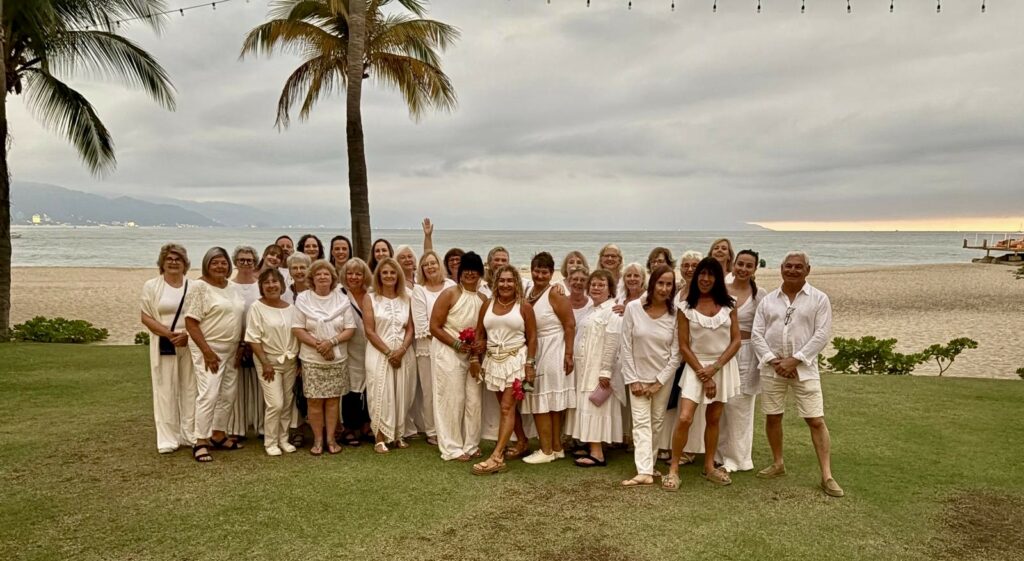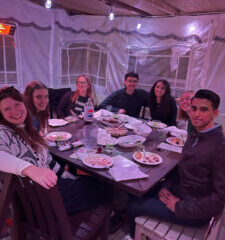Local News
Winnipeg Police Service members receive angry reception at Jewish Federation event meant to give advice on personal safety

By BERNIE BELLAN (Posted Nov. 9) The Multipurpose Room in the Asper Campus was supposed to have been filled last night by members of the community wanting to hear from representatives of the Winnipeg Police Service in an event billed as “Responding to Hate: Safety and Security Presentation.”
But there were many empty chairs. Attendees had been required to register in advance – and registration was cut off at 200. Apparently many of those 200 who had registered decided not to come – which was a terrible shame, since many others who had wanted to attend had been told there was no room for them.
What ensued Wednesday evening beginning at 7:10 pm, Wednesday evening, November 8, in the Multipurpose Room of the Campus was a somewhat disorganized series of presentations by various members of the WPS, followed by what became at times a quite heated, often emotional question and answer session.
Here are the major takeaways from the event:
Jewish Federation President Gustavo Zentner introduced eight different members of the WPS to the audience. He said that “this is a community dedicated to the rule of law. We are extremely concerned when we see people burning Israeli flags and when we see police standing by them when they are chanting “From the river to the sea, Palestine will be free.”
Dave Dalal, Superintendent, Uniform Operations, WPS, told the audience that, on October 26, the WPS had asked representatives from both the pro-Palestine and pro-Israel communities not to hold counter protests when the other side was holding a rally. Since that date, both sides had respected the WPS’s request, Dalal said.
Dalal asked that anyone who has information or a complaint about what might be considered a hate crime should call the police non-emergency line: 204-986-6222, and press 8 on the dial pad.
In addition to information given by Dalal, there was also interesting information given by Gord Perrier, Director of Campus Security at the University of Manitoba.
Responses that Dalal and Perrier gave to questions from the audience provided greater insight into the thinking of senior police officers than one might have expected. Dalal especially was quite defensive when he was accused of allowing hate speech to occur at various pro-Palestinian rallies that have taken place in recent weeks. When Dalal (and other members of the WPS who were present) claimed that nothing that had been heard at any of those rallies would have constituted a “hate crime,” local pro-Israel organizer Ron East challenged members of the WPS, asking them whether they had anyone on the force who spoke Arabic?
East claimed that some of what had been said at some of those rallies – in Arabic – would have qualified as hate speech. In response, Dalal did say that the WPS does have members on the force who speak Arabic. He also said that there are Jewish members in the WPS.
Another audience member said he has audio evidence of hate speech in Arabic that was said at one of those rallies. Dalal asked that audience member to give that evidence to the WPS.
Another WPS representative, Bonnie Emerson (Community Engagement) gave a fairly lengthy presentation on how hate speech is defined in the criminal code.
In response to a question why pro-Palestinian protesters were allowed to block off Portage and Main, Emerson said, “It’s complex – and we’re dealing with a crowd environment. We have to be deliberate and careful when we take action.”
With reference to whether something is “hate speech,” Emerson said “It’s not clear what is hate speech. For the Jewish community it may be hate speech, but to other communities it may not be. The criminal code is not specific. Unless there is case law backing up that it’s hate speech, it’s not illegal.”
In response, Gustavo Zentner suggested that “part of the (angry) reaction from the back (where some people had been interrupting Emerson’s remarks) is people take it as an endorsement by inaction.”
Gord Perrier, Director of Campus Security (who was also a 25-year veteran of the WPS) was not at the front of the room when the eight members of the WPS gave various presentations to the audience. Dalal referred to his presence, however and, in response to a direct question from a member of the audience who said they were concerned about the safety of Jewish students at the University of Manitoba, Dalal asked Perrier whether he could answer the question.
Perrier spoke about a “vigil” that was held by pro-Palestinian students at the U of M on October 13. He said there had been consultation with organizers of the vigil prior to the event. The organizers were told there could be “no chanting” and “no flags on staffs.” (According to Perrier, flag staffs could be considered weapons.)
When chanting did begin, one of the organizers attempted to have the chanting stopped, Perrier said, but he was ignored to start with. Also, a flagstaff did appear.
Perrier also addressed the question of hate speech – and why no one has been charged with a hate crime yet in Manitoba since October 7. (To provide some context, many members of the audience were angry that pro-Palestinian demonstrators are continually allowed to chant “From the river to the sea, Palestine will be free.”)
Perrier explained that a charge of hate speech has to be approved by the attorney general of the province in which the hate speech has allegedly occurred.
He admitted though, that despite the campus police at the U of M having “increased physical security on campus… a lot of the staff don’t have historical knowledge” of what’s led up to the heated atmosphere between pro-Palestinian and pro-Israel students. “There’s a lot of training going on,” Perrier noted.
“We reach out to every organizer of a rally telling them it has to be respectful and safe,” he suggested.
Another audience member referred to what is apparently a very tense situation at St. Johns Ravenscourt school, saying “I have kids at SJR and we’re seeing a lot of conflict between Arab and Jewish kids.”
That person said his kid had been told “We’re going to finish you.”
At one point Gustavo Zentner referred to something that is being planned for “November 13,” but he didn’t immediately explain what he was talking about. It was only after a while that he said there is some sort of walkout being planned for high schools in Winnipeg that day. (We contacted Ruth Ashrafi, Regional Director, B’nai Brith Canada, to ask whether she knew what Gustavo was talking about. Ruth sent us a picture of a poster that’s circulating on social media by a group known as “Queers for Palestine,” which in itself is a ridiculous name as queers are persecuted in Palestinian areas – often killed – thrown off rooftops by Hamas, for instance, and often flee to Israel where they’re safe, but let’s leave aside one of the many contradictions associated with pro-Palestinian groups.)

An audience member asked Superintendent Dalal, “What would you do if it was your family being threatened?”
Dalal responded: “We are bound by the rule of law. We have Jewish officers. We also have officers who wish and hope that their neighbours don’t know they’re police officers.”
Someone else asked: “How do we make our kids feel safe when they’re in a school where they know other kids hate them?”
Part of the answer that was given was “There are many people in the MIddle Eastern community here who are opposed to antisemitism.”
To Israelis in the audience – Gustavo Zentner had this to say: “Everyone of us who was either born in Israel or moved there – we are mindful of your concerns.”
And, in addressing the often heated criticism levelled at the WPS during what turned into a very emotional evening for some members of the audience, Jewish Federation President Jeff Lieberman said, “We’ve been in constant touch with the WPS since October 7 and we appreciate that the moment we asked you (WPS) whether you would come out and meet with us tonight – you agreed.”
Local News
Second annual Taste of Limmud to feature Jewish dishes from around the world

By MYRON LOVE Many words in English have multiple meanings. Take the word “taste” for example. There is the literal meaning – the sense of taste; it can also mean sample – or preferences. It can be a noun or a verb.
In “A Taste of Limmud,” the term is used both in its literal meaning – as a sampling of Jewish dishes from different parts of the world, as well as a prelude to our community’s upcoming 16th celebration of Jewish learning and culture, which is scheduled for Sunday, March 15.
This is the second year for “A Taste of Limmud,” which is coming up on Thursday, February 19. The event will be held at the Shaarey Zedek and will feature Jewish dishes from Argentina, Yemen, Turkiye, Aleppo and Eastern Europe, as well as Israel .
“We sold out last year for A Taste of Limmud,” reports Raya Margulets, Winnipeg Limmud’s newly appointed co-ordinator. “We had 120 participants last year. I am hoping to have 150 this year.”
The 2025 debut of “A Taste of Limmud” was actually Margulets’ introduction to the Winnipeg Limmud co-ordinating team. Originally from Israel, Margulets’ first position with the Jewish Federation of Winnipeg was in 2022 when she was appointed Hillel director – after she had served as Hillel student president at the University of Manitoba.
She left her role with Hillel after having served as director for two years to participate in the ten-month online Israel 21c Digital Ambassador program, which is aimed at young people between the ages of 18 and 25. That program is part-time and casual, conducted remotely, intended to provide basic experience in digital communication and storytelling focused on everyday life in Israel.
“I spent a few hours a week working on simple digital content and social media, attended occasional online seminars, and participated in light collaborative projects,” Margulets reports. “The focus was on sharing positive, apolitical cultural stories rather than politics or advocacy.”
She was hired last year to oversee our first Taste of Limmud – as a special project that was funded by the Jewish Foundation of Manitoba.
She was appointed at the beginning of September as Limmud Co-ordinator, replacing Florencia Katz, the original co-ordinator, who stepped away after 15 years in the role. Katz remains a member of the Federation staff as Director of Education and Engagement. She also has a focus on the PJ Library program.
“Florencia was a great mentor and is still a big help to me,” Margulets says.
She reports that the upcoming 16th annual Winnipeg Limmud will once again feature a wide and eclectic range of speakers. “I can confirm that all of our community’s rabbis – as well as Rabbi Benarroch – will be among the presenters,” she notes. “Rabbi Benarroch will be coming from Israel and be here in person.”
Also confirmed thus far are Yaron Deckel, an Israeli journalist and broadcaster, as well as Haskel Greenfield, Distinguished Professor of Anthropology, and Winnipeg’s own Rimon Art Collective. Collective members include young Jewish artists Mishelle Aminov Kosonovsky, Yael Freifeld, Etel Shevelev, Halley Ritter, and Shan Pullan
Stay tuned for further updates as to other 2026 Winnipeg Limmud presenters on this website or go online to keep up to date or register for programs at limmudwinnipeg.org.
Local News
Sharon Delbridge’s annual health & wellness retreats in Puerto Vallarta have become popular with many Winnipeggers

By BERNIE BELLAN Over the years we have revisited stories from time to time – to catch up with individuals who have made a mark in this city and to see where their lives have taken them since the last time we wrote about them.
One such individual is Sharon Delbridge, the youngest daughter of Sol and Rachel Fink, and younger sister to Percy, Shayla (Posen), and the late Sheldon Fink (who died all too young at the age 57 in 2021).
Myron Love has written many times about Sol and Rachel Fink, who continue to amaze for their vitality – with Sol now 101 and Rachel having just turned 99.
As Sharon notes in an email sent to me, “My parents work out everyday. Not at Rady anymore. They do exercise at home & in their condo gym (200 Tuxedo) Move their bodies daily. My mom leads her and my dad daily in movement. It’s incredible.
“They have been a huge inspiration to all of us.”
Aside from the fact that the Fink family was a very musical family, their penchant for fitness is clearly something that rubbed off on Sharon, in particular.
My own wife, Meachelle, who was quite the fitness fanatic herself in her day (not that she’s been put out to pasture quite yet), profiled Sharon for The Jewish Post & News in 2015. In that story, Sharon explained how she came to be one of the most popular and best known fitness instructors, not only at the Rady JCC – where her classes in a wide variety of different areas, were – and still are, extremely popular, but at many other venues throughout Winnipeg.
Here’s part of what Sharon told Meachelle about how she came to teach so many different types of fitness classes:
“I’ve been into fitness my whole life. I come from a very musical family but also a family that always works out. When I was in my 20s I was teaching aerobics for several years as a part-time job while in university. When I had my three children (Milan, Jared and Cassie Ackerman) I ran a hand-painted clothing business in my home called Milan Designs, and I sold to ladies’ and children’s stores all over Canada.
“I was always working out and have loved fitness classes. I went back and got more certifications in my 40s. I’m certified to teach many specialties and have been actively teaching at the Rady for over 10 years. I now specialize in women’s boutique fitness: Zumba, Yoga and Barre classes. The three specialties blend beautifully together and I have a big following of people from all over Winnipeg that come to my classes. I have every Zumba certification that’s available: Zumba, Zumba Gold (for seniors), Zumba Toning (with weights), Zumba Aqua (in water), Zumba Step and Zumba Sentao (using steppers and chairs).
“I’ve taken many yoga certifications through the past 10 years and I’ve been teaching Barre classes, which are the latest and hottest classes for women. I’m always taking new training in these three specialties to continue to stay fresh and always have new and exciting things to present to my class. That’s how I stay unique in my field. I’m always learning and always developing my classes to be the best they can be. I spend tons of time finding the best music and choreographing.
“I truly feel that if you work out and look after your body, you will always have a positive outlook on life. Exercise is a huge healer mentally and physically. I have seen so many incredible changes in women that come to my classes. They have transformed their bodies and live happier and healthier lives.”
It was a year after Meachelle’s article about Sharon that Sharon and her husband, Darcy, began going to Puerto Vallarta for the winter. As Sharon noted, “I started teaching at a Yoga studio the first winter we were here in PV. It’s easy to meet people & build community when you’re teaching snowbirds from everywhere
I love sharing my love for fitness & yoga & moving our bodies.”
But, for six years prior to making Puerto Vallarta her and Darcy’s winter home, Sharon had already been conducting annual one-week health and wellness retreats in Puerto Vallarta. She has continued to conduct those retreats every year since. The most recent retreat was held from January 25-February 1 at the Fiesta Americana All Inclusive Resort.
Here’s how Sharon describes the purpose of those retreats:
“For over 15 years, my Health & Wellness Retreat has brought together women of all ages to reconnect, recharge, and celebrate movement, friendship, and balance. Hosted at a beautiful all-inclusive resort, guests can truly make the week their own holiday experience. While primarily a women’s retreat, many now bring their husbands or partners who are welcome to participate as much or as little as they choose.
“Throughout the week, we offer seven daily classes ranging from sunrise meditation and yoga to toning, Zumba, yin yoga, and our signature Aqua Zumba — which transforms into a high-energy, joy-filled pool party. Each evening, we gather for sunset yoga and take time to celebrate the beauty of the day together.
“The retreat blends wellness with enjoyment, allowing guests to indulge in the resort’s wonderful restaurants and social atmosphere while still feeling strong, energized, and revitalized. It’s a balanced, uplifting experience where participants leave feeling nourished in body, mind, and heart, often forming lifelong friendships. This year, we were proud to welcome 40 participants.”

In the picture accompanying this article you might recognize several Winnipeggers. I asked Sharon how many Winnipeggers were participants in this year’s retreat?
The answer, she said, was the majority (31) were from Winnipeg, while six were from Las Vegas, one from Ottawa and two from Edmonton.
The last two years, Sharon also noted, another well known member of the Rady JCC staff, Dona Watts-Hastings, who’s a physiotherapist, also a yoga and Pilates instructor, has joined Sharon in conducting the retreat. Sharon adds that Dona’s physiotherapy clinic is inside the Rady JCC. Dona also brings some of her clients to the retreat.
I wondered though, how active Sharon is in teaching classes when she’s back in Winnipeg? Does she never tire of teaching so many classes? I wondered.
Sharon’s answer was: “Yes, I’m still in Winnipeg half of the year and I will always teach at the Rady… Zumba, sculpt , yoga & barre class – also spinning if they need me to sub. . I teach at Assiniboine park and other gyms, too. Every morning I teach and often sub other classes. Busy all spring & summer.”
Whew! It’s tiring just reading about everything Sharon does. If you would like to find out more about next year’s health & wellness retreat in Puerto Vallarta and how you might be able to join up, contact Sharon at sharon@freshsoulfitness.com.
To watch a video of what a typical day at the retreat consisted of go to freshsoulfitness
Local News
Jess Pudavick: artist and business executive

By MYRON LOVE Jess Pudavick is a rare individual in that she combines careers as an artist and a business executive.
I first became aware of Jess last summer when she was one of the artists/craftspeople with a display table at the Gwen Secter Creative Living Centre’s annual garage and craft sale. What piqued my interest was her focus on incorporating resins in her art pieces.
Last week, while interviewing Ms. Pudavick at Super-Lite Lighting on Waverley – I learned much more about the multi-talented Ms. Pudavick.
While I have a passion for art,” she notes, “I was not interested in becoming a stereotypical starving artist.”
The daughter of Stuart and Beth Pudavick joined the company (which her father acquired in the early 1980s (along with partners Simon Simkin and Allan Hochman) 17 years ago. Her brother, Ray, also joined the company 10 years ago, Jess notes.
At Super-Lite, Jess’s title is Custom Homes Lighting Consultant. She works with builders, designers and contractors to build the lighting for the home, as well as to choose the right lights for the space. She also manages the company’s social media and website.
“I enjoy working with my dad and Ray,” she says.”I also love what I do at Super-Lite. It is similar to my feelings about my art. You don’t know the end result when you start. It is nice to see something being built from nothing and seeing the end result – and knowing how happy the client is in the end.”.
As an artist, the graduate of Brock Corydon’s Hebrew Bilingual Program, Shaftesbury Collegiate and the University of Manitoba, recalls that she started at a young age. “As a kid,” she says, “I was always doodling and drawing cartoons.”
While she has worked with several different artistic media, she observes that what she likes about creating art with resins is the challenge.
“Resin is a temperamental material,” she points out. “When you start a project, you have no idea what the finished product will look like.”
She explains that there are two ways to work with resin. You can put traditional resin in a mold and wait 24 hours for the resin to dry. Or you can speed up the process by using a UV style resin and exposing the resin to UV rays.
“I prefer letting the resin dry naturally,” she says. “I find I have more control over it.”
Her resin-infused art comes in many forms. She produces earrings and necklaces, candle holders and ashtrays, dice and computer keys. She has also created resin-infused mahjong and rummikub tiles and even sets of dominoes with paw prints. A popular item, Jess says, is a custom coloured/theme wedding set of dominoes.
“People love them,” she says of the dominoes tiles.
(The latter reflects her own passion for dogs for which she is often a foster “parent”. She notes that she also creates resin-infused memory keepsake urns for the ashes/hair or fur of beloved pets – a product that is gaining popularity.)
Then there is the resin-infused coffee table that has a place of honour in her own home. “With my love of plants and resin, my partner and I took our existing coffee table, added various clippings of my own plants and created a fun resin-sealed table,” she recounts. “It really looks cool. It is unique. it attracts visitors’ interest. Every time I look at it, I see something different.”
Jess reports that generally sells her works of art through craft sales and her Instagram page (@thejesso09) for between $10 and $30. Her major source of sales though, she adds, is through word of mouth.
But Pudavick avers that she doesn’t do her art with an eye to sales.
“I create for myself, not for the approval of others. I find it relaxing – a good way to reduce stress. It’s also rewarding to see that others want something you have created.”
She strongly believes that enjoying your work is an important element in being happy. Equally important, she notes, – both in business and art – is to have satisfied customers.






